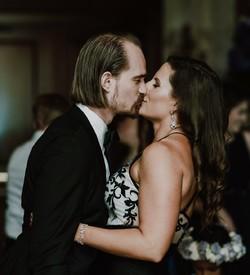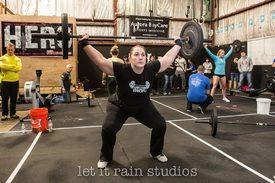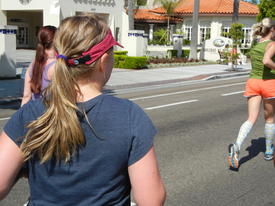Half Marathon Goal Pace Question

AggieCass09
Posts: 1,867 Member
I've been running since January 2007 and have completed one full marathon (5:48 in 2008 at 180 lbs) and one half marathon (2:39:10 in 2010 at 180 lbs), both in Houston. I am running the Houston half again this January as well as the Austin Half in February. and am currently at 162 with the pound per week steadily coming off. My training plan is the same as always from runners world.com, but I'm executing the runs 84,759,924,162 times better than previous years. For example, my "comfortable-i-can-do-this-forever" pace in previous years was 11:10 this year its 10:20 (and could be faster but I'm afraid of burning out and getting shin splints again).
So, my question is what is a reasonable (but still challenging) "goal" pace for my halfs this year? I defiantly want to (and will) be under my previous PR of 2:39:10 but is 2:20 (10:40/ mile) reasonable/challenging enough? My longest run thus far is 7 miles and I ran that comfortably on pace for the 2:20 goal. What is TOO ambitious? I think my brain still thinks I'm 180 and that anything under four digits per mile is "too fast."
Suggestions of how I can determine what is a reasonable/challenging goal pace?
So, my question is what is a reasonable (but still challenging) "goal" pace for my halfs this year? I defiantly want to (and will) be under my previous PR of 2:39:10 but is 2:20 (10:40/ mile) reasonable/challenging enough? My longest run thus far is 7 miles and I ran that comfortably on pace for the 2:20 goal. What is TOO ambitious? I think my brain still thinks I'm 180 and that anything under four digits per mile is "too fast."
Suggestions of how I can determine what is a reasonable/challenging goal pace?
0
Replies
-
No advice Cass but a question --- how did you get faster? Did it just happen naturally or did you do something to make it happen? What I mean is, did you just get faster as you lost weight....0
-
I'm still stumped on this... I was on a run one day this fall and realized I'm actually running (not jogging, which is how I started, granted when I started it was so hard to "jog" that I felt like I was "running." But now that i'm faster and am REALLY "running" what i had previously considered "running" is now really "jogging" if that makes sense at all). It just kind of happened. I didnt do anything differently in terms of running BUT I have been eating SO much better than before and then theres that minor detail of the 22 lb weight loss (:-D and more to come)...it just happened and I'm not complaining.
Now that I'm out of my comfort zone of the 11:10/mile pace I don't know what my splits should be for the halfs 0
0 -
bump0
-
I found these on RunnersWold.com...has anyone tried them? are they accurate?
Tune-up races
Run one or two all-out tune-up races in the weeks before the marathon taper to get a time that can be converted to a sensible marathon goal time. Try Greg McMillan's "McMillan Running Calculator" (at mcmillanrunning.com) to convert your race times to marathon-equivalent times. Just remember that the longer the race, the more accurate the "conversion"--and the more time you need to allow between the tune-up race and the marathon itself (at least two weeks for a 5-K; four weeks for a half-marathon).
Yasso 800s
A number of our panelists suggested doing this workout to help you determine a realistic marathon pace. Three or four weeks before the marathon, do a track workout of 10 x 800 meters with a 400-meter jog. You should be spent after the last repeat. The average of your 800 times is a good barometer of how fast you can run in the marathon--but in hours and minutes instead of minutes and seconds.
Magic miles
Jeff Galloway has his runners do a "magic mile"--an all-out mile on the track after a warmup--once every three or four weeks. Multiply that time by 1.3, he says, and you get a good marathon-pace goal.0 -
You might check out the Daniels tables. If you Google "Daniels tables running" (without quotes) you'll get links to free downloadable spreadsheets. The spreadsheets require you to enter current height, weight, and pace info and then calculate various training and race paces for popular distances.
HTH.0 -
For me both Galloway and McMillan methods are good estimators. I usually use the "mile" as the baseline distance to race. Note that your Max Half Marathon pace is abour 1.2 x "magic mile", but Galloway suggests training at a slower pace 1.3x "magic mile" plus add 2min. That is the theory, but in my experience slower runners (> 11 min pace) have a harder time making the SLOW run "slow enough" so the training pace might be more like 1.3 x "magic mile" (without the 2 min adder)... not sure why this is the case but seems to be the trend in newer/slower runners.
Tip - run your "magic mile" as fast as you possibly can - you should be huffing and puffing when you cross the finish, it's OK to stop and walk a few steps each lap if you need.
A word of warning - these estimators usually assume that you have a GREAT race day, if there are factors which affect you (heat, humidity, fatigue, "just not my day"), don't feel bad if you need to slow down a bit.0 -
add sprints...but run at a pace about 2 minutes slower than your 10k pace...0
-
If you are comfortably training at 10:20, you will in all likelyhood run faster than the 10:40 you are planning on for your half day. I think it might have been Galloway that calculates you run about 10% faster on race day? Purely on adrenaline and such. However, I would run your first half (of the half) at your 10:40 pace, then if you are feeling good, pick it up. I ran a half in November hoping to get under 2 hours--I went our way to fast and was dead at the end finishing in 2:00:23. Still a 9 minute PR, but I was so mad about the rookie mistake.
Good luck!0
This discussion has been closed.
Categories
- All Categories
- 1.4M Health, Wellness and Goals
- 398.2K Introduce Yourself
- 44.7K Getting Started
- 261K Health and Weight Loss
- 176.4K Food and Nutrition
- 47.7K Recipes
- 233K Fitness and Exercise
- 462 Sleep, Mindfulness and Overall Wellness
- 6.5K Goal: Maintaining Weight
- 8.7K Goal: Gaining Weight and Body Building
- 153.5K Motivation and Support
- 8.4K Challenges
- 1.4K Debate Club
- 96.5K Chit-Chat
- 2.6K Fun and Games
- 4.8K MyFitnessPal Information
- 12 News and Announcements
- 21 MyFitnessPal Academy
- 1.6K Feature Suggestions and Ideas
- 3.2K MyFitnessPal Tech Support Questions





